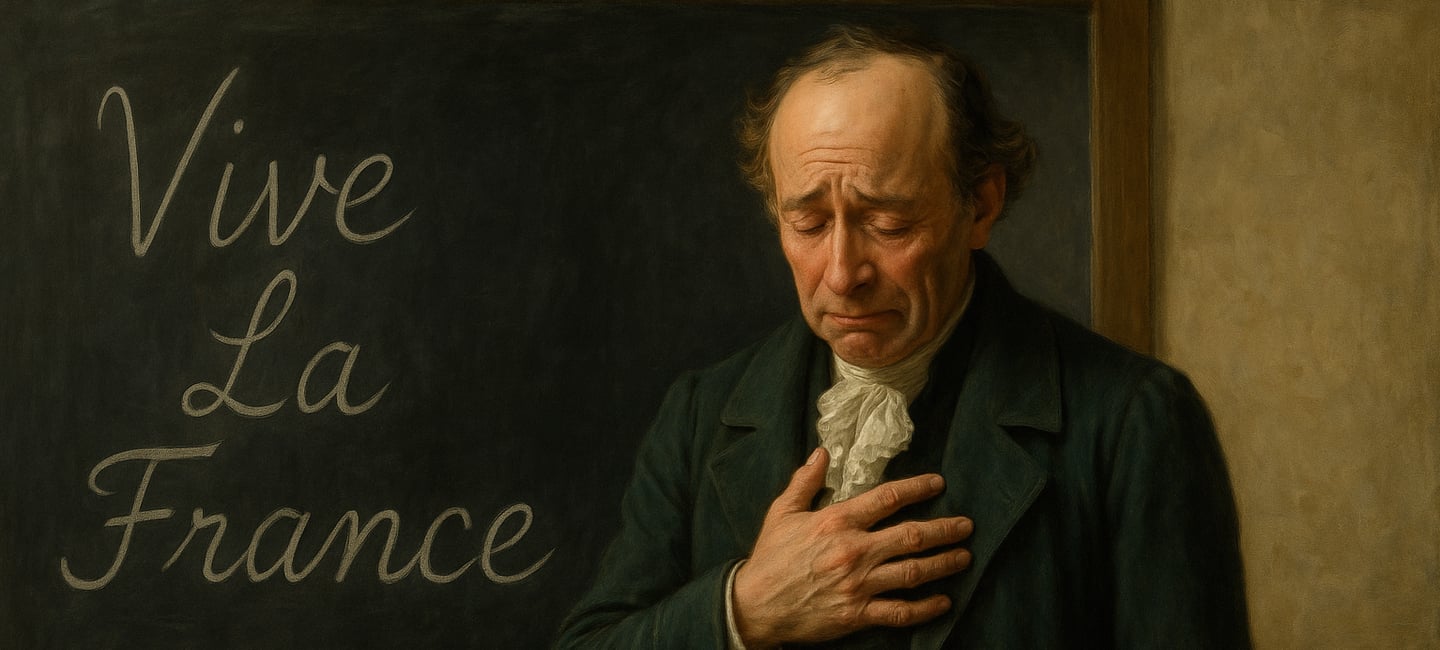The Last Lesson


THE LAST LESSON
1. Characters
- Franz - Adjectives: Curious, Regretful, Distracted, Innocent, Emotional
- Character Sketch: Franz, a young boy, is reluctant to attend school and often distracted. He later regrets neglecting his studies when he learns it is his last French lesson. His transformation reflects the importance of one’s language and identity.
- M. Hamel - Adjectives: Patriotic, Stern, Compassionate, Dedicated, Melancholic
- Character Sketch: M. Hamel is a strict but passionate teacher who loves the French language. His emotions and sense of duty intensify on his last day, teaching with profound sadness as he bids farewell to his students and his profession.
- Villagers (Old Hauser, Blacksmith, etc.) - Adjectives: Regretful, Respectful, Sad, Patriotic, Observant
- Character Sketch: The villagers, who once neglected learning French, come to M. Hamel’s class as a mark of respect for the teacher and their language. Their presence underscores the collective loss of cultural and linguistic identity.
2. Central Theme and Subthemes in the Chapter
- Central Theme:
The main theme of The Last Lesson is the loss of linguistic and cultural identity due to political dominance and colonization. The imposition of the German language on the French districts of Alsace and Lorraine symbolizes how language is intertwined with national pride and personal freedom.
- Subthemes:
- Patriotism and Identity: The emotional connection between language and national identity is strongly portrayed through the regret of losing the right to study in one’s own language.
- Regret and Neglect: Franz’s personal regret of not learning French earlier mirrors the collective regret of the village for not valuing their language and education.
- The Role of Education: M. Hamel’s final lesson underlines the importance of education and how it transcends the barriers of time, politics, and occupation.
- Change and Resistance: The chapter highlights the inevitability of change under political rule and the emotional resistance people feel toward this change.
3. Relatively Tough Words with Meanings
- Dread: A strong fear or apprehension about something
- Bustle: A busy or hurried movement
- Reproach: To blame or express disapproval
- Thunderclap: A sudden and shocking event
- Tempting: Appealing or inviting, causing desire
- Cranky: Bad-tempered, irritable
- Choked: Unable to speak due to emotion or difficulty in breathing
- Wretches: Miserable or unfortunate people
- In unison: Doing or saying something together, in agreement
- Enslaved: Made to be controlled or ruled over; deprived of freedom
4. List of Good Expressions and Phrases for Answer Writing
- "In great dread of a scolding"
- "Everything had to be as quiet as Sunday morning"
- "The idea that he was going away, that I should never see him again, made me forget all about his ruler and how cranky he was."
- "We’ve all a great deal to reproach ourselves with."
- "When a people are enslaved, as long as they hold fast to their language it is as if they had the key to their prison."
- "What a thunderclap these words were to me!"
- "The pigeons cooed very low, and I thought to myself, 'Will they make them sing in German, even the pigeons?'"
5. Use of Poetic Devices and Figures of Speech
- Metaphor: - "When a people are enslaved, as long as they hold fast to their language, it is as if they had the key to their prison." (language compared to a key)
- Personification: - "The pigeons cooed very low, and I thought to myself, 'Will they make them sing in German, even the pigeons?'" (pigeons given the human ability to sing)
- Hyperbole: - "What a thunderclap these words were to me!" (exaggeration of the impact of M. Hamel’s words)
6. Chronology-Based Summary (Telegraphic Style)
Franz’s Dread (Beginning of the Day)
- Late for School: Franz, a young student, is running late for school. He fears a scolding from his teacher, M. Hamel, who had announced a lesson on participles, a topic Franz hasn’t prepared for.
- Temptation to Skip School: As he walks to school, Franz feels tempted to skip class. The warm weather, chirping birds, and Prussian soldiers drilling in the fields seem far more appealing than schoolwork. However, he fights the temptation and hurries to school.
- Crowd at the Bulletin-Board: On his way, Franz notices a crowd gathered at the town hall’s bulletin-board. For the past two years, this board had brought bad news about lost battles, military drafts, and orders from the Prussian authorities. Although curious, Franz continues to school without stopping to find out the latest news.
Arrival at School (Unusual Atmosphere)
- Quiet School Environment: Upon reaching school, Franz is surprised by the unusual silence. Normally, there’s a lot of noise—students chattering, desks opening and closing, and M. Hamel’s ruler tapping on the table. However, today, it feels as quiet as a Sunday morning.
- Villagers in the Classroom: As Franz enters the classroom, he notices that some villagers, including old Hauser, the former postmaster, and the former mayor, are sitting on the back benches, which are usually empty. Their presence makes the atmosphere even more solemn and serious.
- M. Hamel’s Special Attire: M. Hamel, who usually wears a simple outfit, is dressed in his best clothes—his green coat, frilled shirt, and black silk cap, which he usually reserves for inspection days or special occasions.
M. Hamel’s Announcement (The Last French Lesson)
- Berlin’s Order: Once the class begins, M. Hamel makes a shocking announcement: this will be the last French lesson for the students. The Prussian government has ordered that only German be taught in the schools of Alsace and Lorraine from the next day. A new teacher will come to replace him.
- Franz’s Regret: Franz is struck with immense regret. He realizes that he has been careless with his studies and neglected his lessons. He feels sorry for not learning French when he had the chance and wishes he had taken his education more seriously. He even feels a newfound appreciation for his textbooks, which he previously found burdensome.
Reflection on the French Language
- M. Hamel’s Reflection: M. Hamel speaks about the beauty and importance of the French language. He describes it as the most beautiful, clearest, and most logical language in the world. He urges the class to guard their language and never forget it, as holding on to one’s language is a form of resistance against enslavement. It’s a key to preserving freedom and identity.
- Villagers’ Regret: The villagers, who had neglected their education when they were younger, attend this last class as a way of showing respect to M. Hamel for his 40 years of service. They are also filled with regret for not valuing their language and education earlier.
M. Hamel’s teaching (A Day of Deep Learning)
- Grammar and Writing: Despite the emotional weight of the day, M. Hamel remains committed to teaching. He patiently explains the grammar lesson, which Franz finds surprisingly easy to understand. The students also practice writing with new copies that read "France, Alsace, France, Alsace." These words seem to hang like little flags all over the classroom, symbolizing their national pride.
- Quiet Dedication: The entire class works in silence, focusing on their lessons. Even the youngest students, who are just learning their letters, seem determined to make the most of this last lesson. The only sound is the scratching of pens on paper.
- Emotional Atmosphere: As the lesson continues, Franz notices old Hauser sitting at the back, trying to keep up with the children’s reading. He is so moved that tears roll down his face, and his voice trembles with emotion. The entire scene is filled with a sense of loss and sorrow.
Final Farewell (End of the Lesson)
- Church Bell and Trumpets: As the church clock strikes twelve and the Prussian soldiers' trumpets sound in the distance, marking the end of the class, the weight of the moment becomes even more intense.
- M. Hamel’s Emotional Exit: M. Hamel stands up to speak, but he is choked with emotion and can’t continue. Without saying a word, he picks up a piece of chalk and writes on the blackboard in large letters: “Vive La France!” ("Long Live France!").
- Dismissal of the Class: After writing the phrase, M. Hamel makes a simple gesture, indicating that the class is dismissed. The chapter ends on a poignant note, with Franz and the others leaving the school in silence, deeply affected by the experience.
Education
Simplifying learning with interactive lessons and videos.
Support
Resources
learnatease001@gmail.com
© 2025. All rights reserved.
